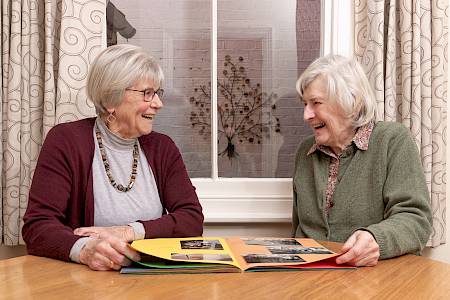You don’t need to be a safeguarding expert to volunteer with Re-engage. However, we want to ensure that you have the necessary information and support to identify and report any potential safeguarding concerns or incidents.
Don’t worry, this isn’t an exam, so why not make yourself a cup of tea or coffee and try this training exercise.
Please read the scenario below and answer the questions that follow. You’ll find the answers at the bottom of the page, but no cheating.
Martin is 84 and still lives independently. He joined his local Re-engage activity group about a year ago, where he is a regular attendee.
Last week, Martin phoned his group coordinator, June, to let her know that he wouldn’t be able to attend the activity group for a while.
June noticed that Martin sounded upset and so she asked him if everything was OK. Martin explained that whilst his new house was being decorated, he had stayed with his son and his son’s partner.
Martin told her that this had been an upsetting time, as he had been verbally and emotionally abused by his son's partner. On top of this, his closest friend, John, had recently died and he was struggling to cope with the loss.
Martin told June that, whilst he is now in his new home and no longer in contact with his son and his partner, the events had affected him so badly that he didn’t want to attend the activity group for a while.
June was worried about Martin’s wellbeing and immediately submitted an online safeguarding concern form saying that she thought Martin might be in danger, having recently experienced verbal and emotional abuse. She added that he was grieving for his friend and was in a very low mood.
Questions
Answers
1. Do you think that Martin’s case is a safeguarding concern?
a. Yes
b. No
c. Possibly
2. What are the key indicators that June should look for in her conversation with Martin to identify a potential safeguarding concern or incident? You can select more than one answer.
a. Any changes in Martin’s behaviour. This might include being anxious or not wanting to continue the conversation.
b. Being fearful of staying at home on his own and not feeling safe.
c. Constantly mentioning his son’s partner and the abuse he experienced.
d. Complaining about his low mood and not feeling well.
e. Complaining about serious health issues.
3. What would you have done in June’s place? You can select more than one answer.
a. I would listen to Martin but not do anything as it’s not my responsibility.
b. I would ask Martin some more questions about his current situation before reporting it.
c. I would help Martin to deal with this situation and feel better soon.
d. I would do as June did and complete an online safeguarding concern form.
Q1: b
Martin is not in immediate danger as he mentioned that he has moved out of his son’s house and has had no further contact with him or his partner. This is not a safeguarding concern or incident.
Q2: a, b, and e
There were changes in Martin's behavour as he did not want to attend the activity groups for a while and he was in a low mood. However, as Martin is no longer living at his son’s house, he is not feeling fearful or unsafe and is no longer in contact with his son or his partner. Martin did not mention of any serious health concerns during the the conversation.
Q3: b
Martin’s experiences whilst staying at his son’s, in conjunction with the loss of his friend, could have a negative impact on his mental health. However, this case is not a safeguarding concern.
It is often good practice to ask more questions to ensure that someone isn’t in immediate danger. For example, in this instance June could have double checked that Martin feels safe in his own house.
Our aim is to ensure that you can identify and report potential safeguarding issues. But your volunteering role does not include the responsibilities of a support worker or healthcare professional. For more information, please refer to the setting boundaries and managing expectations page on our website.
If you have any further questions about safeguarding, please take a look at the safeguarding training and FAQs on our website.
-
View
More news

Volunteers' Week 2022 - Meet Maureen and Sheila
To celebrate Volunteers' Week we caught up with former tea party coordinators, Maureen and Sheila who, between them, volunteered for a total of 100 years for Re-engage before retiring in 2021.
By Re-engage

Linda is a guest and volunteer for her local activity group in Wales
Linda, 76, joined her local activity group in her hometown of Penarth as a guest and she liked it so much that she is now the group coordinator. She may be retired, but she likes to keep busy with volunteering and recently completed an Open University degree focusing in health and social care. Fortunately, we found space in her diary for a catch up.
By Re-engage

